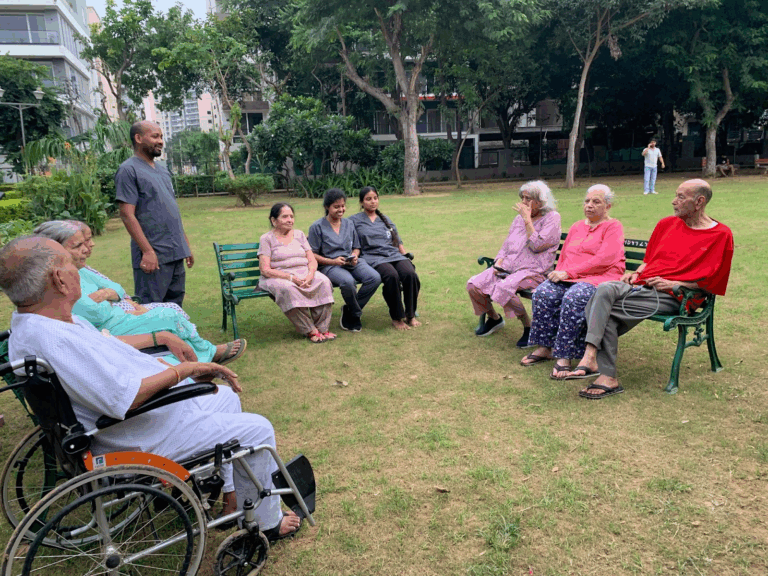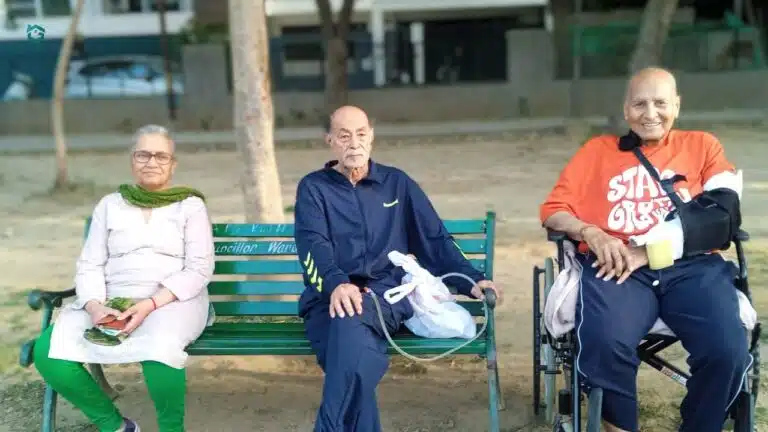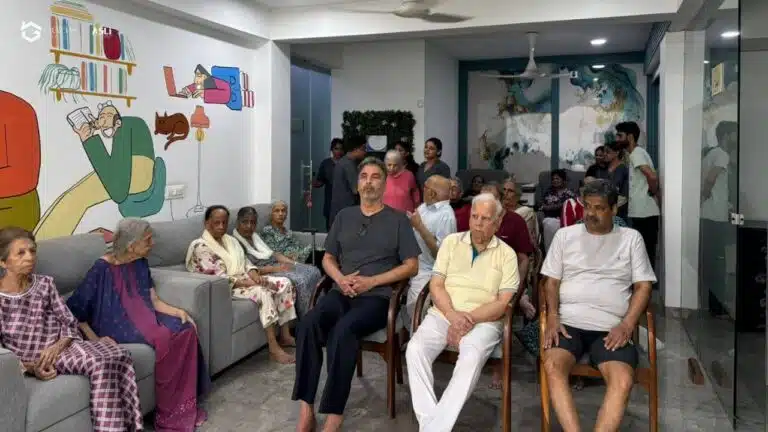Quick Summary of the article:
- Music therapy is a gentle, non-drug approach to support dementia care.
- It helps patients reconnect, express emotions, and engage socially.
- Scientific studies show music activates memory, emotion, and movement in the brain.
- Even in advanced dementia, musical memory often remains strong.
- Personalized songs reduce stress, calm agitation, and improve quality of life.
- With growing evidence, music therapy is becoming a valuable part of dementia care.
Dementia – a dreadful illness that few of us, if any, will manage to escape being touched by somehow. And as memory and cognition decline, people may have difficulty communicating, remembering and managing their emotions.
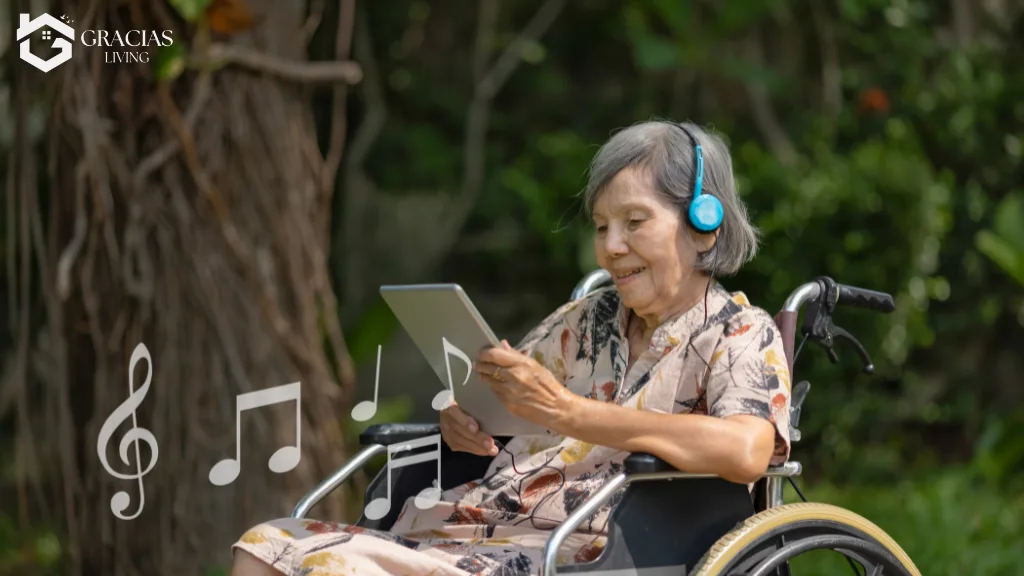
One treatment that has recently sparked the public imagination by borrowing from sound and memory is music therapy. This is another nonpharmacologic path to healing as well as a path to get to possible hardto-reach patients, it offers them comfort and joy and also gives them access to who they are.
What is music therapy dementia?
Evidence-based Music therapy is the use of music therapy techniques in clinical settings, or with specific populations, based on research findings and critically appraised evidence.
With people who have Alzheimer’s disease or another form of dementia, it might be a favorite song, or singing, or a movement like playing a musical instrument, or another piece of movement with rhythm.
It’s a large lever, because music can activate many areas of the brain — those associated with memory, with emotion and with physical motion, which are among the last to be compromised in the progression of the disease. It is silence, or in some instances a substitute for speaking, and a voice let out of jail.
A chipper mini concert at an assisted living home for senior citizens to demonstrate the joy and connection music can bring to those with dementia. It also has the ability to sand down emotions such as restlessness and anxiety, and can stimulate recall in a person and bring back memories and relationships.
Why Playing A Piano Is Good For Your Loved One With Dementia?
The benefits of music therapy dementia are vast and deeply rooted in research. It also offers a cognitive abilities that can improve memory recall and attention.
A 2023 review in Alzheimer’s Research & Therapy found that music therapy significantly improved memory, attention, and verbal fluency in Alzheimer’s patients compared to control groups.
You hear a song that reminds you of a song you loved when you loved it, time and place, and the image and sound is powerful enough to deliver real-live reminiscence and feeling that links you to who you are and who you once were.
Musical memories are often encoded in a part of the brain distinct from verbal memory, and happen to be easier to pull out of long-term storage.
And let’s just say the connection between music therapy and cognition, emotional health, social health (and therapy)? Goes DEEP.
It is also soothing and calming and there is evidence that it can reduce agitation, anxiety, and even depression. Playing music with others is also a great way to increase social contact and community so can help with reducing feelings of isolation.
Music is inspirational and bringing people together, especially to play in a group. It can be a much-needed balm against boredom, a way to tamp down anxiety and depression.
How Dementia Music Therapy Works?
“Alzheimer’s is a very widespread disease and you’re really most likely engaging practically many areas in the brain if you’re working in music therapy.
When our ears take in music, the cerebral cortex, which is involved in higher functions like memory and language, and the limbic system, which is more related to emotions, engage in an exquisite symphony. It’s what can make any tune able to transport us elsewhere, to another moment.
This connection between music and memory is especially important for individuals with dementia. And even if the brain can no longer recall new events, it seems to be able to link to that music. It allows them to really see and commune.
The tempo is also ideal for developing motor skills and coordination, In addition to the physical benefits, music from The Songs I Sing, is a great addition to any fitness or dance program, including physical therapy.

The Science Behind Music’s Impact
And what music can do to the brain is just extraordinary.” The Ultimate Brain Musicotherapy When we listening to a song we will stimulate some part of the brain.
The sound is decrypted by the auditory cortex, and the limbic system (which includes the hippocampus, a key memory region, and the amygdala, a center of emotion) sends a flag to remind you to search and re-search that music at a later date or to pull up memories, associations, emotions and reminiscences from long ago.
But in those with dementia, these musical pathways are largely undamaged, and listening to songs can provide an alternate route to access not only that person, but also memories that would otherwise be out of reach.
The rhythmic aspects of music also engage the motor cortex, said David Levitin, a cognitive simulation psychologist at McGill University in Montreal, which explains why someone who can’t walk can still tap her feet or move to the beat.
Where Music And Memory Meet In The Brain?
The strange connection between music and memory It’s an odd little bit of neuroscience. Whalen adds:
“The area of the brain that retrieves musical memories is one of the last to be affected by Alzheimer’s-related memory loss.”
This could also be that information about the music is being elaborated and encoded into a large network of brain regions that are not as devastated by the disease. By way of analogy, it can be a kind of bypass, connecting injured areas of the brain to more primitive routes of memory or emotion.
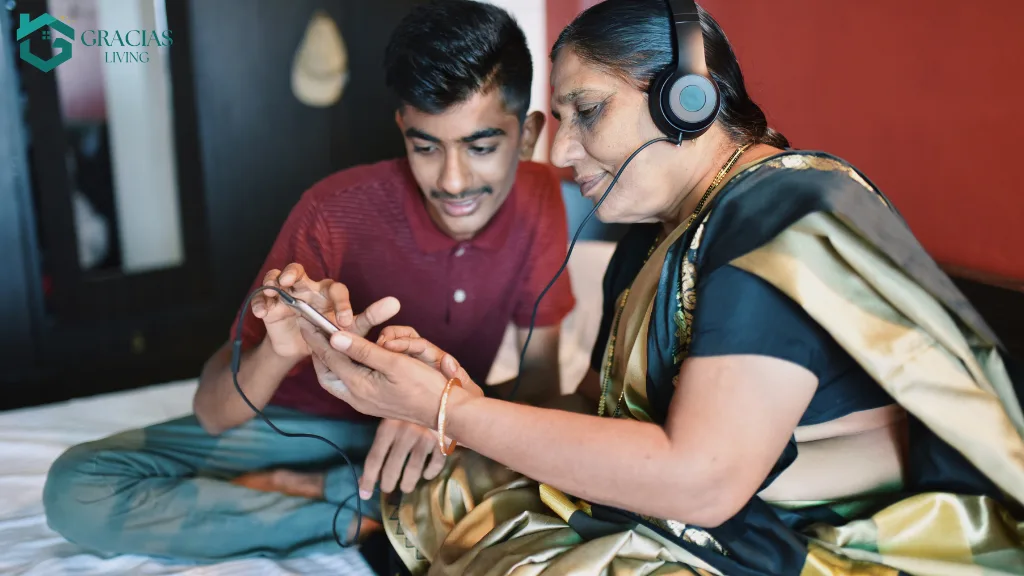
That’s why the same person who can no longer speak can still sing to you a much-loved tune — in key even — and can remember not just the tune, but also the era in which he grafittied his identity alongside it to as near it as plays on the radio before fading out.
How music affects brain and dementia?
Music has actual physiology, measureable physiology, effects on our bodies and brains, which is why researchers promote being deliberate about the music you listen to.
On a physiological level, relaxing music slows the heart rate, lowers blood pressure and even reduces muscular tension. These hormones also travel to the brain and may be the mechanism that underlies the mood boost and altered experience of pain.
Other possible things you may want hear: Music may also slow down your heart rate, lower your blood pressure and reduce muscle tension. Music has the ability to affect and involve many regions of your brain. “It’s a beautiful thing to do with someone who has dementia.”
What Music Is Most Soothing to Patients With Dementia?
Studies show that the type of music that usually works best for people with dementia is what they listened to when they were young or what comes from their past and is meaningful to them personally.
That can be anything from tunes they grew up with in their teens and early 20s, to songs that bring specific memories or experiences to mind. The genres are flexible, from classical and jazz to rock and folk music.
Consider the user’s taste in music and what they can’t stand: “What might be calming for me could make someone else feel super jumpy. Some playlist goodness might be good.
Music therapy dementia in Care Homes
Music therapy is gradually being utilized in Assisted living and nursing homes and senior housing. It’s something productive for residents to do, and it breaks up the day.” They have group singalongs, concerts, one-on-one sessions with a music therapist in care homes.
The sessions — which can be customized to residents’ individual needs (calming agitation before bed, for instance, or increasing social engagement during the day) — can be customized here.
Music is often used as a medium to uplift, to engage people, to encourage social interaction, and to feel that one is being cared for at home.
Caregivers at Home: Comfort Care and Music
You don’t have to be a therapist to gift your loved one some of the things music has to offer. Some ideas for bringing music therapy home:
Make Playlists
Create a playlist of songs from when you were a kid for your child; distribute via music streaming services or on mp3 players. If music is more your style, you could poll the family for their favorite tunes, or have them choose from the music that most resonated with them during the decades in which they reached adulthood.
Time It Right
Experiment with timing: surely you can anticipate a time of day when music is welcomed, depending on which type of you are. The light ca be calming for people who exhibit symptoms of “sundowning,” or invigorating in the mornings.
Enable Audience Participation
Instead of just listening to the music in question, have your audience listen to the music in question. Sing to them — maybe tap it out on their hand or have them shuffle or dance a little. That shared slovenly us-time is also quite the san bonding deal especially. real friends canter uwp royale right Friendship Verified Infocest.
Reaction
How do they react? “If it gets you mad or it gets you amped, power down a song and try another one. The idea is to provide comfort and joy, not more pressure.
Dementia levels of care in nursing homes
Dementia is a common characteristic in nursing home care. For all the magic of music therapy, there are still issues about which it’s not quite so straightforward. And this isn’t: Great music everyone would simply love.
Some could also react negatively to a certain song or type of music and you want to read how they react and shift gears.
Caregivers also have to pay attention not only to the quantity of the input, but everything around the input, as being over stimulated can also be problematic for people living with dementia. We need that uniformity, but we also need a bit of flexibility.
Conclusion
Dementia music therapy: A therapy to be understated for patients with dementia. It’s a daily form of communication, of pulling us out of the realm of cognition or speaking that we lose when we have dementia, a chance to try to convey emotions, interact socially, to bring us back to better times.
Simply playing one’s favorite music can ease and make laugh and can lead one back to one’s self. And as more studies continue to validate the power of music in the brain, we can only hope that music therapy will continue to be an even more powerful means of improving the lives of those with dementia.
Frequently Asked Questions (FAQ)
1. Is There Any Proof That Music Therapy Works In End-Stage Dementia?
Yes, music therapy can be effective even later in the progression of the dementia. Even when language and other expressions of higher thought (rationale, etc.) are very much impaired, the responsiveness to music, on the most primitive level, is frequently preserved. It can be calming, help soothe agitation, perhaps provide a point of connection.
2. What exactly is music therapy doing to the brain that can bring a soothing balm to people with dementia?
The treatment focuses on specific brain sites linked to mood, memory, and movement. For many, music connects with collective social trauma, bringing back experiences even if not directly lived. Music acts like a memory boost—its tones continue playing, refreshing perceptions, triggering feedback from memories, and opening pathways to recall, process, and engage with emotions deeply.
3. Is music therapy at home dementia something families can try at home?
Absolutely. Families aren’t professional music therapists, however, and incorporating music into the day is easy for families. Listening to a playlist or dancing it out, they can all be small but powerful ways to connect with a family member and friend living with dementia.
4. Does music therapy help dementia?
Yes, music therapy is an evidence-based intervention that has been empirically demonstrated to reduce symptoms of agitation, anxiety and depression in individuals with dementia.
5. What are the effects of music therapy on anxiety in patients with dementia?
Your body instinctively reacts to music, from its heart rate to blood pressure. The sound of familiar, comforting music can also bring comfort, serenity and calm to a loved one with dementia, and reduce restlessness and anxiety.


